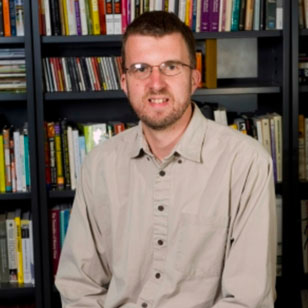
David Wild
When everything is going fine, David Wild gets a little uncomfortable.
An associate professor of informatics and computing at the Luddy School of Informatics, Computing, and Engineering, Wild is also one of the directors of IU’s Crisis Technologies Innovation Lab, which places him in a unique position to react as the world faces the challenge of the novel coronavirus and the outbreak of COVID-19. Wild has based part of his career on preparing for this moment.
“I thrive in crisis situations, which is why I got into this line of work,” Wild says. “There’s a certain satisfaction in being able to meet needs and challenges, in figuring out how to do the impossible. You have to approach challenges with a certain amount of calm.”
CTIL is used to working in a crisis environment. In the months leading up to the COVID pandemic, CTIL has created tools to assist with emergency responses to hurricanes, tornadoes, flooding, and wildfires. The lab is filled with resourceful, agile people who quickly adapt to emergency situations. The rise of COVID-19 has created its own set of issues, but CTIL personnel has been ready to act. The work also has been bolstered by new funding from the IU Office of the Vice President for Research that has been directed toward the COVID-19 fight.
“The emergence of COVID-19 has been big, but we’ve had an incredible effort by people in the lab,” Wild says. “We’ve had people volunteering to help out any way they can, working weekends and trying to come up with solutions for the problems we’re facing. I take my hat off the work the people at CTIL.”
The lab is working with multiple agencies and industries to develop the tools needed to deal with the spread of the coronavirus.
For instance, CTIL is working with Disaster Technologies, a firm based in Washington, D.C., as well as Microsoft, nVidia, and Kinetica to build a useful data-science based dashboard for COVID-19 to help emergency managers make decisions about allocating resources. It will provide a module for emergency managers and companies to upload their own data and provide them a decision-making tool that is based on information instead of emotion.
CTIL has also fielded requests from educational institutions as well as local, state, and federal agencies for help with collection and analysis of data that can more easily provide insights.
“IU wanted to understand the level of restrictions that have been placed on students from outside Indiana so school administrations could understand what their students were going through,” Wild says. “That created a partnership with IU Public Safety and Institutional Assurance to create a dashboard that provides a score rating the level of travel restrictions faced by students.”
The same dashboard techniques have been used to discover how different businesses are impacted by disasters and how different industries react to challenges. Supported by an ongoing grant from the federal Economic Development Administration and using a county-by-county breakdown across the United States, users can identify the most vulnerable locations and better allocate resources to provide support.
Another system keeps track of critical issues that may arise for local agencies. In Bloomington, CTIL has built a status dashboard to keep track of various critical issues facing city agencies so resources may be adjusted to support different needs during the COVID-19 crisis. A job board also was created to provide city workers and managers information on where skills may be needed, making connections between people and the work that needs to be done easier.
The use of technology and data science in disaster management has been slow to take hold over the years, but situations such as the COVID-19 outbreak showcase how useful tech can be for managing emergencies.
“Crisis is the new normal,” Wild says. “Emergency responders and crisis responders have been historically underserved by technology, machine learning, and artificial intelligence. Even before COVID, our lives were full of wildfires and hurricanes, and climate change is upping the ante. The Federal Emergency Management Agency is constantly stretched to the limit, and there is a desperate need for data science tools and technology to better manage resources.
“That’s our passion at CTIL. Over the next few months, we want to build tools for emergency managers, make their lives easier, and allow them to use their resources more efficiently. We want to accelerate our efforts and get tools to FEMA, the EDA, and other decision-makers.”
Beyond tools to help allocate resources, CTIL is focused on helping the economy.
“The emphasis of responders currently is on saving lives,” Wild says. “But COVID-19 is also going to have a massive economic impact. Our work in partnership with IU’s StatsAmerica, funded by the EDA, could provide important insights into which businesses should be coming back online first and how we enable new businesses to start up as we come out of this situation. We want to know what conditions can help them thrive, and we have algorithms that will help make those decisions.”
Make no mistake, Wild would prefer to be struggling in a comfortable world. But that’s not reality, and it’s CTIL’s job to make an impact for emergency responders and emergency managers. The lab also is pursuing further support from FEMA and the Department of Homeland Security for funding for potential projects.
“There’s a huge gap between what can be done and what is happening,” Wild says. “It can be frustrating. I see emergency managers struggle, and we know so much needs to be done. But the fact we can do something to help is satisfying, and helping in emergencies is what we’re all about.”

